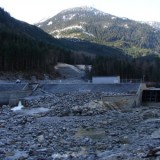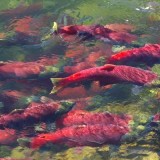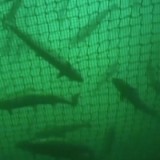Whether or not salmon farms continue operating in BC’s marine waters may depend more on economic than environmental factors. Despite withering criticism concerning the ecological safety of its open net-pen operations, the salmon farming industry has doggedly continued on its corporate course. However, two unforeseen factors may compromise its viability, thereby accomplishing what no amount of environmental censure has managed.
First, the US International Trade Commission has removed a two-decade 24 percent import duty levied on farmed salmon imported from Norway. This ruling may ultimately negate one of the major rationales Norwegian corporations used in 1991 to circumvent the duty by growing Atlantic salmon in BC waters. The removal of the duty now places a 24 percent disadvantage on farmed salmon exported from BC to the US, a trading handicap exacerbated by the rising value of the Canadian dollar.
And second, after the horrific 70 percent collapse of salmon farming in Chile due to the industry’s inadvertent importation of infectious salmon anemia, Chilean banks and governments are applying pressure for a re-start of operations. This will result in more farmed fish on the global market and will depress the price for salmon. Combined with the lower cost of growing salmon in Chile, the result may threaten operations in BC. The salmon farming industry in BC, critics note, is already precarious due to high operating costs. A flood of Chilean farmed fish on the world market and cheaper product from Norway may be lethal blows to the industry here. And, as everyone knows, the business of making money is not imbued with sentimentality – if salmon farming is not profitable here, the industry will politely express its ritual condolences and leave.
Oil raises more complicated and serious issues than salmon farming. And Enbridge’s proposed Northern Gateway pipeline, that intends to move tar sands bitumen from Alberta to BC’s West Coast, may cause far more economic damage than a few salmon farms abandoning Canada. To assess this damage, we need to know something about oil pricing.
Most North Americans are likely unaware that the price of oil is determined in two ways. The Canadian and US price is set “at a confluence of pipelines at Cushing, Oklahoma, where prices are determined for a specified grade of crude termed West Texas Intermediate” (Island Tides, Mar. 8/12). WTI is presently priced at about $108 per barrel. But for the rest of the world, in regions such as Asia and Europe, their oil is priced by international markets at a higher “Brent” rate. The Brent price is presently about $126 per barrel. The price difference is important to the oil industry. And this explains the significance of the proposed Northern Gateway pipeline.
Alberta crude from the tar sands would not pass through the pricing gate in Cushing, Oklahoma. Indeed, it would be destined for Asia where the Brent rather than the WTI price applies. Any corporation producing oil from the tar sands would benefit measurably from the premium value of Brent and would push for this pricing structure. At the very least, in free market conditions, the price difference between Brent and WTI would force up the cost of oil to consumers in Canada.
The same cost pressure would apply to natural gas. Its North American price is determined by the volume moving through “a confluence of thirteen pipelines at Erath, Louisiana”, the so-called “Henry Hub” (Ibid.). This price is linked to the WTI price of oil, and is presently selling at between $2 to $3 per million British thermal units (MMBtu). But natural gas in Asia and elsewhere is linked to the Brent oil price, where it commonly sells for two to four times the North American price. The huge volume of natural gas that would be diverted from BC and Alberta to several liquid natural gas (LNG) plants on the West Coast would bypass the Henry Hub on its way to Asia. Besides depleting a non-renewable resource with massive exports, the new market would force up the price of natural gas – if not for Canadians, then certainly for British Columbians.
Beyond the litany of environmental problems created by hydraulic fracturing (fracking) to retrieve natural gas from shale, and the inevitable spills associated with the pipeline and tanker movement of oil from the West Coast, British Columbians in particular – and Canadians in general – can expect to pay more for their petroleum based energy.
Globalization always has the effect of shifting prices toward a common denominator. In the case of wages, it pulls down high earnings to match lower Asian rates. In the case of energy such as oil and natural gas, it lifts prices toward matching the higher rates that apply beyond North America.
Even without considering the environmental costs and risks of producing and transporting oil and gas, opening our markets to Asia and elsewhere is an unwise strategy for British Columbians and Canadians. The oil and gas industry should be jubilant at the prospects of pipelines and tankers. But everyone else in this country should be worried. The social and economic costs of a few closed salmon farms in BC would pale beside the damage inflicted by higher energy prices.







